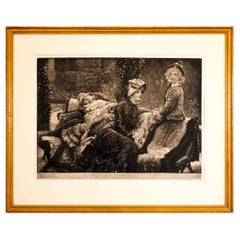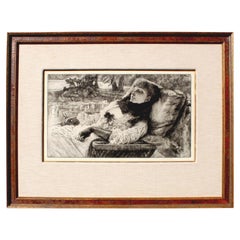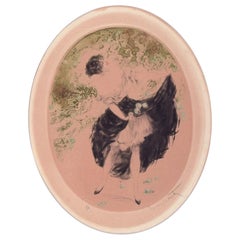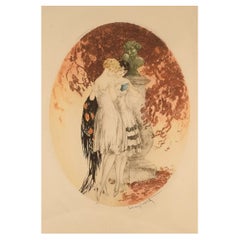James Tissot Furniture
French, 1836-1902
James Jacques Joseph Tissot (October 15, 1836 - August 8, 1902) was a French painter. Tissot was born at Nantes. He studied at the Êcole des Beaux-Arts in Paris under Ingres, Flandrin and Lamothe, and exhibited in the Paris Salon for the first time at the age of twenty-three. In 1855 Tissot moved to Paris where he studied under Jules-Élie Delaunay, Louis Lamothe and Hippolyte Flandrin. Lamothe, who had been a pupil of Ingres, introduced him to Edgar Degas. The two men became close friends. Another friendship formed at this time was with James McNeill Whistler. Two portraits, including one of Tissot's mother, were among the artist's first exhibits at the Paris Salon in 1859. In 1861 he showed The Meeting of Faust and Marguerite, which was purchased by the state for the Luxembourg Gallery. His first characteristic period made him a painter of the charms of women. Demi-mondaine would be more accurate as a description of the series of studies that he called La Femme à Paris.
Tissot fought in the Franco-Prussian War, and, falling under suspicion as a Communard, left Paris for London. Here he studied etching with Sir Seymour Haden, drew caricatures for Vanity Fair, and painted portraits as well as genre subjects. Sometime in the 1870s Tissot met a divorcée, Mrs. Kathleen Newton, who became his muse and the model for many of his paintings.to
1
2
2
1
1
1
2
1
1
2
2
2
2
2
6
12,843
3,850
2,370
2,228
Creator: James Tissot
James Tissot Le Banc de Jardin Mezzotint Etching on Paper Beraldi 66 Edition
By James Tissot
Located in Keego Harbor, MI
A realism style mezzotint etching on paper titled “Le Banc de Jardin (The Garden Bench)” by French artist James Tissot. Signed in the plate. From the Beraldi 66 edition, 1st state. P...
Category
20th Century French James Tissot Furniture
Materials
Paper
James Jacques Joseph Tissot "Soirée d'été" 'Summer Evening' Etching & Dry Point
By James Tissot
Located in Los Angeles, CA
A fine French 19th century etching and drypoint Titled "Soirée d'été" (Summer Evening) by Jacques Joseph Tissot (French, 1836-1902) depicting Mrs. Kathleen Newton resting on a lounge chair. Signed and dated (l/l): J.J. Tissot, 1881 in the plate. Under the mat, the front of the sheet inscribed in pencil with a '1' in a circle, the verso of the sheet with old price inscription "450-" in pencil. Circa: 1881-1882.
Measures: Plate Height: 9 inches (22.9 cm)
Plate Width: 15 1/2 inches (39.4 cm)
Sheet Height: 14 1/2 inches (36.8 cm)
Sheet Width: 20 5/8 inches (52.4 cm)
Frame Height: 19 inches (48.3 cm)
Frame Width: 24 1/2 inches (62.2 cm)
Frame Depth: 1 1/8 inches (2.9 cm)
Literature:
Wentworth 56. Note: Tissot's from 1881 is said to depict his lover, the Irish divorcee Mrs. Kathleen Newton, resting on a lounge chair.
Provenance:
Private collection, Los Angeles, California
Jacques Joseph Tissot (French, 15 October 1836 – 8 August 1902), Anglicized as James Tissot, was a French painter and illustrator. He was a successful painter of Paris society before moving to London in 1871. He became famous as a genre painter of fashionably dressed women shown in various scenes of everyday life. He also painted scenes and characters from the Bible.
Jacques Tissot was born in the city of Nantes in France and spent his early childhood there. His father, Marcel Théodore Tissot, was a successful drapery merchant. His mother, Marie Durand, assisted her husband in the family business and designed hats. A devout Catholic, Tissot's mother instilled pious devotion in the future artist from a very young age. Tissot's youth spent in Nantes likely contributed to his frequent depiction of shipping vessels and boats in his later works. The involvement of his parents in the fashion industry is believed to have been an influence on his painting style, as he depicted women's clothing in fine detail. By the time Tissot was 17, he knew he wanted to pursue painting as a career. His father opposed this, preferring his son to follow a business profession, but the young Tissot gained his mother's support for his chosen vocation. Around this time, he began using the given name of James. By 1854 he was commonly known as James Tissot; he may have adopted it because of his increasing interest in everything English.
In 1856 or 1857, Tissot travelled to Paris to pursue an education in art. While staying with a friend of his mother, painter Elie Delaunay, Tissot enrolled at the Ecole des Beaux-Arts to study in the studios of Hippolyte Flandrin and Louis Lamothe. Both were successful Lyonnaise painters who moved to Paris to study under Jean-Auguste-Dominique Ingres. Lamothe provided the majority of Tissot's studio education, and the young artist studied on his own by copying works at the Louvre, as did most other artists of the time in their early years. Around this time, Tissot also made the acquaintance of the American James McNeill Whistler, and French painters Edgar Degas (who had also been a student of Lamothe and a friend of Delaunay), and Édouard Manet.
In 1859, Tissot exhibited in the Paris Salon for the first time. He showed five paintings of scenes from the Middle Ages, many depicting scenes from Goethe's Faust. These works show the influence in his work of the Belgian painter Henri Leys (Jan August Hendrik Leys), whom Tissot had met in Antwerp earlier that same year. Other influences include the works of the German painters Peter Von Cornelius and Moritz Retzsch. After Tissot had first exhibited at the Salon and before he had been awarded a medal, the French government paid 5,000 francs for his depiction of The Meeting of Faust and Marguerite in 1860, with the painting being exhibited at the Salon the following year, together with a portrait and other paintings.
Émile Péreire supplied Tissot's painting Walk in the Snow for the 1862 international exhibition in London; the next year three paintings by Tissot were displayed at the London gallery of Ernest Gambart.
In about 1863, Tissot suddenly shifted his focus from the medieval style to the depiction of modern life through portraits. During this period, Tissot gained high critical acclaim, and quickly became a success as an artist. Like contemporaries such as Alfred Stevens and Claude Monet, Tissot also explored Japonisme, including Japanese objects and costumes in his pictures and expressing style influence. Degas painted a portrait of Tissot from these years (Metropolitan Museum of Art, New York), in which he is sitting below a Japanese screen hanging on the wall.
Still on Top, 1873
Tissot fought in the Franco-Prussian War as part of the improvised defense of Paris, joining two companies of the Garde Nationale and later as part of the Paris Commune. His 1870 painting La Partie Carrée (The Foursome) evoked the period of the French revolution. Either because of the radical political associations related to the Paris Commune (which he was believed to have joined mostly to protect his own belongings rather than for shared ideology), or because of better opportunities, he left Paris for London in 1871. During this period, Seymour Haden helped him to learn etching techniques. Having already worked as a caricaturist for Thomas Gibson Bowles, the owner of the magazine Vanity Fair, as well as exhibited at the Royal Academy, Tissot arrived with established social and artistic connections in London. Tissot used...
Category
Late 19th Century French Victorian Antique James Tissot Furniture
Materials
Glass, Wood, Paper
$4,985 Sale Price
22% Off
Related Items
Louis Icart Etching on Paper, Seminude Woman Picking Apples
Located in København, Copenhagen
Louis Icart (1888-1950). Etching on paper. Seminude woman picking apples.
circa 1920.
Signed in pencil.
In excellent condition.
Visible dimensions: 24 x 19 cm.
Category
1920s French Vintage James Tissot Furniture
Materials
Paper
Louis Icart, Etching on Paper, "Look", Dated 1928
Located in København, Copenhagen
Louis Icart (1888-1950). Etching on paper. "Look".
Dated 1928.
Visible dimensions: 46 x 35 cm.
Total dimensions incl. passepartout: 67 x 49 cm.
The frame measures: 2 cm.
In exc...
Category
1920s French Art Deco Vintage James Tissot Furniture
Materials
Paper
Nicolas de Larmessin Etching, Habit de Tabletier
Located in Montreal, Quebec
Nicolas de Larmessin Etching – Habit de Tabletier. 20th century print.
Nicolas de Larmessin (1640-1725) was an enormously creative and productive artist. Nicolas was part of a long ...
Category
20th Century French Renaissance James Tissot Furniture
Materials
Wood, Paper
18th Century Philip James Loutherbourg Portrait English Miniature Paper Etching
Located in Milano, MI
18th century Philip James de Loutherbourg Portrait English school miniature etching on paper, of oval shape, set in a black and gold decoration frame...
Category
Late 18th Century English Antique James Tissot Furniture
Materials
Paper
$597
H 7.09 in W 5.52 in D 0.79 in
Louis Icart, Etching on Paper, "Madame Butterfly", Dated 1927
Located in København, Copenhagen
Louis Icart (1888-1950). Etching on paper. "Madame Butterfly". Dated 1927.
Visible dimensions: 51 x 35 cm.
Total dimensions incl. passepartout: 66 x 47 cm.
The frame measures: 4 c...
Category
1920s French Art Deco Vintage James Tissot Furniture
Materials
Paper
French Engraving, "Le Premier Pas a la Fortune" in Gilded Frame
Located in Pembroke, MA
French engraving in a 19th century entitled "Le Premier Pas A La Fortune" on hand-laid paper with a decorative giltwood frame. A charming double-entendre scene of seduction. Du Bois ...
Category
19th Century French Louis XV Antique James Tissot Furniture
Materials
Giltwood, Paper
Giovanni Antonio Canal 'Canaletto' Etching of Prato Della, Venice, 1697-1768
By Giovanni Antonio Canal (Canaletto)
Located in Oklahoma City, OK
Lovely etching on paper in back ink by Giovanni Antonio Canal (Canaletto).
Measurements:
22" x 15"
Hand-numbered in pencil at the bottom ri...
Category
18th Century Italian Rococo Antique James Tissot Furniture
Materials
Paper
$4,350
H 15 in W 22 in D 0.01 in
Large Framed French Etching of Versailles, Le Bassin d’Encelade
Located in Montreal, Quebec
Large Framed French Etching of Versailles – Le Bassin d’Encelade
Pair of Versailles themed prints available.
From Mis en Demeure, Paris.
Category
Late 20th Century French Louis XVI James Tissot Furniture
Materials
Wood, Paper
Louis Icart, Etching on Paper, "Départ", Approx. 1920
Located in København, Copenhagen
Louis Icart (1888-1950). Etching on paper. "Départ". Approx. 1920.
Visible dimensions: 42 x 30 cm.
Total dimensions: 52 x 40 cm.
Signed in pencil.
In excellent condition.
Category
1920s French Vintage James Tissot Furniture
Materials
Other
Louis Icart, Etching on Paper, Semi-Nude Woman Picking Grapes
Located in København, Copenhagen
Louis Icart (1888-1950). Etching on paper. Semi-nude woman picking grapes. Ca. 1920.
Signed in pencil.
In excellent condition.
Visible dimensions: 24 x 18.5 cm.
Total dimensions:...
Category
1920s French Art Deco Vintage James Tissot Furniture
Materials
Paper
Louis Icart, Etching on Paper, "Arrival", Approx. 1920
Located in København, Copenhagen
Louis Icart (1888-1950). Etching on paper. "Arrival". Approx. 1920
Visible dimensions: 42 x 30 cm.
Total dimensions: 39 x 49 cm.
The frame measures: 7 cm.
Signed in pencil.
In e...
Category
1920s French Art Deco Vintage James Tissot Furniture
Materials
Other
Louis Icart, Etching on Paper, "Wishing Well", Dated 1925
Located in København, Copenhagen
Louis Icart (1888-1950). Etching on paper. "Wishing Well". Dated 1925.
Visible dimensions: 43 x 28 cm.
Total dimensions: 54 x 40 cm.
The frame measures: 2.5 cm.
In excellent cond...
Category
1920s French Art Deco Vintage James Tissot Furniture
Materials
Paper
James Tissot furniture for sale on 1stDibs.
James Tissot furniture are available for sale on 1stDibs. These distinctive items are frequently made of wood and are designed with extraordinary care. There are many options to choose from in our collection of James Tissot furniture, although brown editions of this piece are particularly popular. Many of the original furniture by James Tissot were created in the Victorian style in france during the 19th century. If you’re looking for additional options, many customers also consider furniture by Thomas Victor Sergent, and Thomas Sergent. Prices for James Tissot furniture can differ depending upon size, time period and other attributes — on 1stDibs, these items begin at $5,160 and can go as high as $5,160, while a piece like these, on average, fetch $5,160.
Questions About James Tissot Furniture
- Was James Tissot catholic?1 Answer1stDibs ExpertApril 5, 2022Yes, the noted painter James Tissot was a devout Catholic. It’s believed that he developed his religious devotion because of his mother’s convictions and beliefs. His best known works typically display women in very fashionable clothing of the era. On 1stDibs, find a variety of original artwork from top artists.



